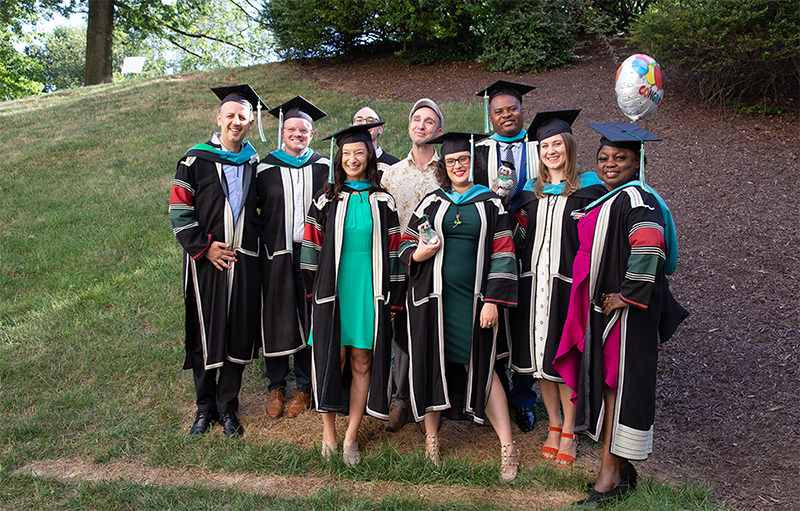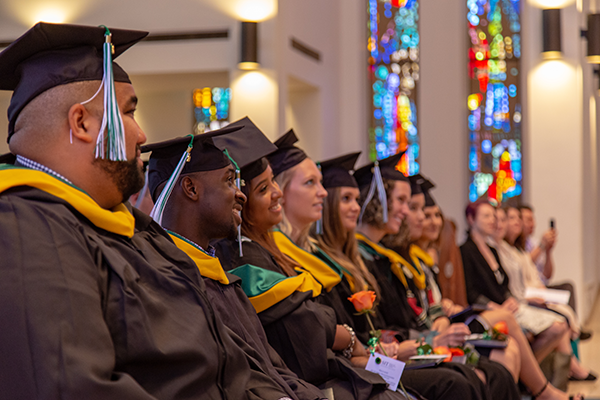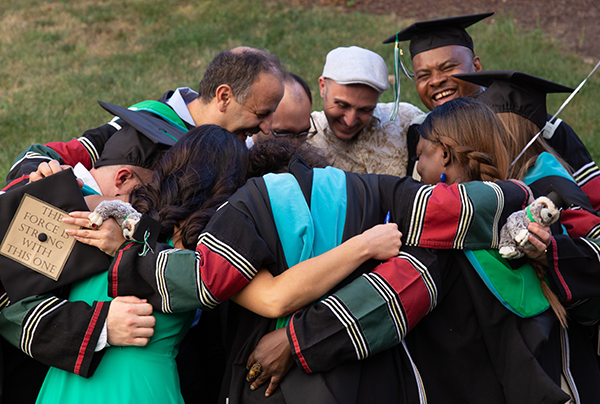SIT Graduate Institute marks 8th annual degree ceremony in Washington, DC
Announcement Date: August 12, 2019

WASHINGTON, DC — Seventeen students received master’s degrees on August 11 during a ceremony at the National Presbyterian Church that emphasized the importance of cultivating community to build a more sustainable world. It was an historic day: Nine of the graduates hailed from the first cohort of SIT’s new Climate Change and Global Sustainability degree program. Eight completed the hybrid master’s program in Sustainable Development with a focus on international policy and management.
“Both of these programs are first of a kind,” Dr. Ken Williams, dean of SIT Graduate Institute, told the students in his welcoming remarks.
Graduates were praised both as pioneers and passionate advocates for global sustainability throughout the ceremony, which was punctuated by the sounds of African drumming by soloist Roy Horton.
“You now have a degree and experience that sets you apart from the others,” said Dr. Deborah Robinson, the Graduate Center’s academic director in Washington, DC. “Thank you so much in advance for helping to save the world.”
Robinson was honored as a professor emerita during the ceremony. SIT also presented a certificate of appreciation to Joyce Howland, coordinator of DC Student Services.
Graduates were also encouraged to look to each other for solidarity as they set out to create change.
“The people who get the most done, for themselves and for the world, are the people who have networks that support them, and networks that they support,” said keynote speaker Ian Fisk, executive director of the Mentor Capital Network, a group of more than 1,000 individuals who have built, managed, invested in, or studied social enterprises. “To that end, I recommend that you keep this particular audience with you for as long as you can. Because your best resources for career success are sitting in this room. They’re your classmates.”
It was clear that the graduates agreed.
Michael Keel spoke on behalf of the students in the Sustainable Development program, offering kind words to each of his classmates and pointing out the importance of developing supportive communities like the one they’d found. “Sustainable development is about people,” he said. “It’s about all of us. It’s about taking care of people and lifting each other up.”

Similarly, Cassidy Madden said that her cohort in the Climate Change and Global Sustainability program pushed each other to think about climate change in new ways as they hiked glaciers in Iceland and snorkeled in the coral reefs of Tanzania. She pointed out that the global degree format — in which students spent each semester in various parts of the world to see how climate change affects ecosystems differently — not only brought the students together but also gave them valuable insight into what is truly a global problem. “The world we live in is an interconnected one,” she said. “I’m confident together we will confront these tremendous challenges.”
Dr. Sophia Howlett, president of SIT, urged the graduates not to let those challenges overwhelm them. She noted that while it’s easy to turn away from difficult things happening in the world — from climate change to mass shootings — she’s proud of the students for choosing to tackle global problems instead. “You’ve shown that you care and you’re going to do something,” she said.
For now, though, these graduates face a more immediate challenge: finding jobs.
In his remarks, Fisk shared the stories of social entrepreneurs who have sought to make a difference through their work, whether they’ve founded ethical chocolate companies or created businesses that hire former child soldiers. “I strongly encourage you to find work that makes you happy and helps you to feel valuable to the world,” he said.
They’ll be pursuing that work in fields from farming to fashion.

Colin Byers, who received his degree in Climate Change and Global Sustainability, hopes to find work on a hydroponic farm or in the field of climate disaster mitigation. Charles Mfortow, who commuted from Atlanta once a month for the in-person portion of the hybrid Sustainable Development program, will continue promoting clean water, particularly in his local Cameroonian community. And Aimee-Rose Reker Aranada plans to not only incorporate sustainable practices in her own work as a fashion stylist and buyer but to further develop the toolkit she created for her capstone project that will help others in the fashion industry pursue sustainable business practices.
“It feels amazing,” Reder Aranada says of her completed degree. “I’m excited to see where everybody goes.”
